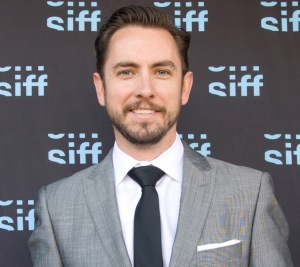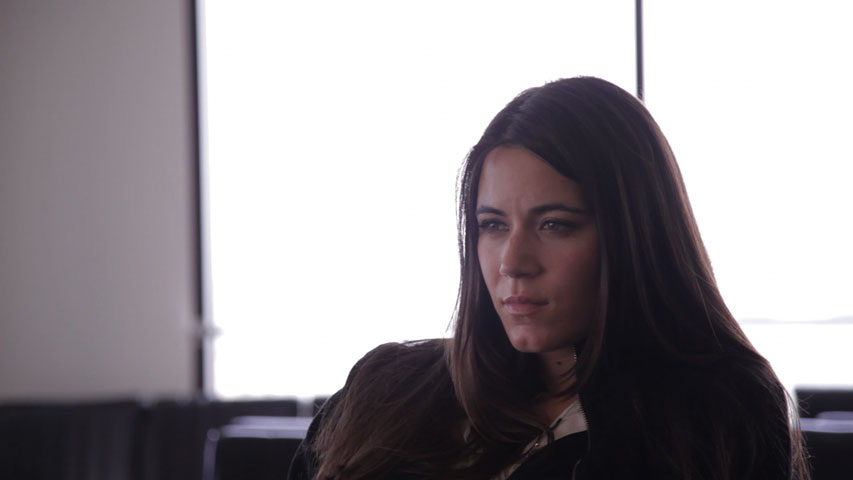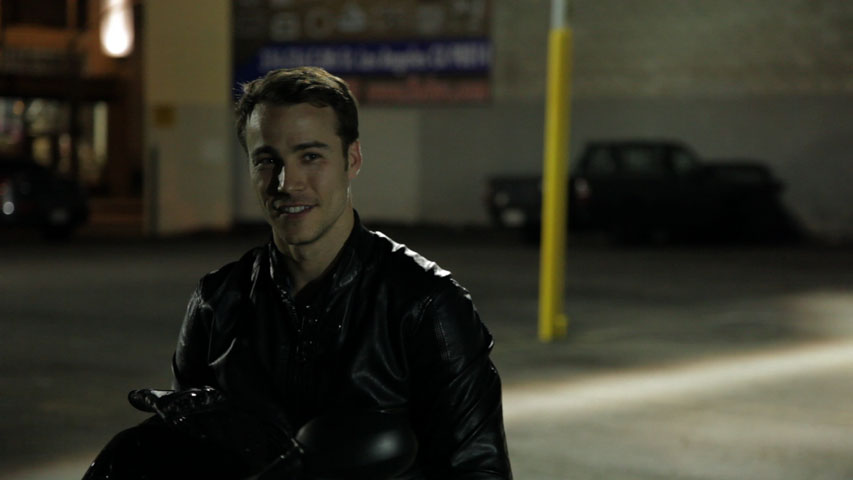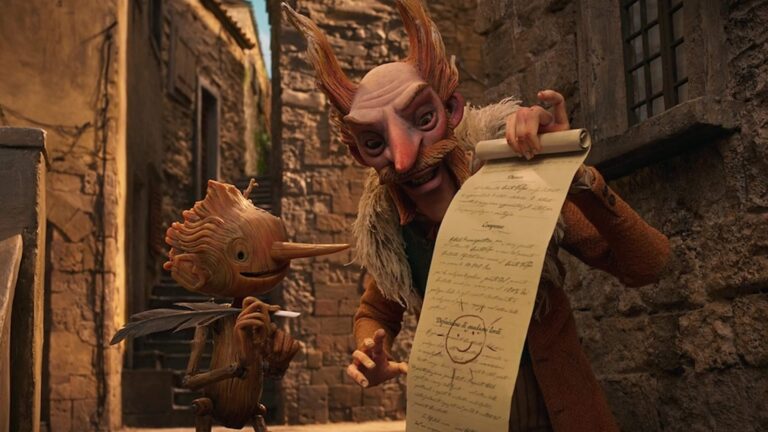Five Low-Budget Feature Writing Tips With Layover Writer/Director Joshua Caldwell

Joshua Caldwell is an MTV Movie Award winning director, writer, and producer. He has worked with a number of high-profile producers, including CSI: creator Anthony E. Zuiker. His award-winning short film Dig, starring Mark Margolis of Breaking Bad, was featured in numerous film festivals and his Superman fan fiction short film Resignation screened at Comic-Con 2014. LAYOVER had its World Premiere at the 2014 Seattle International Film Festival where it was nominated for the prestigious FIPRESCI New American Cinema Award.
In 2013, faced with the prospect of turning thirty and a baby on the way, I set out to direct my first feature film. And in May of 2014 I premiered that film, LAYOVER, at the Seattle International Film Festival. Today, it is available to download at LayoverFilm.com (http://www.layoverfilm.com). The film was produced with a total budget of $6,000.
My goal with LAYOVER was to prove that you could make a quality film for very little money without restricting the scope of the story (i.e. two characters in one location). As such, one of the big keys to our success was the script. Writing for an incredibly limited budget isn’t easy, but it’s not impossible.
Here are some things I’ve learned about writing a no-budget film:
- 1. Utilize modular storytelling. The easiest way to understand modular storytelling is to think of a movie camera (film or digital, take your pick). At its most basic, it’s a lens and a camera body. However, because of how a camera is designed, you can add on extra items like a rails system, mattebox, follow focus, monitors, and gadgets of all kinds. But adding those things doesn’t change the fundamental nature of the camera itself: a body and a lens. And even if you can’t afford all those other add-ons, you can still use the camera.
The camera and lens is your story, and all the add-ons are the things that you may or may not be able to afford (chase scenes, props, cars, locations, etc). Removing those items doesn’t change the story you're trying to tell.
The story is the story, whether you have these other things or not. You should be able to tell an engaging, interesting version of the story without the bells and whistles. The easiest way to think about this is:
- 2. Your story should be able to take place in a vacuum. I don’t necessarily mean it should be two characters in a white room; rather, it’s that you have the ability to shift and adjust things as you make it. If your film cannot be made anywhere else except for a very specific location that is unobtainable on a low budget, then you’re going to run into problems.
In LAYOVER, most of the scenes could have been set in any location. While some details of the conversation might have been adjusted, the fundamentals of the scene wouldn’t have had to change. In that way, the lookout could have been any lookout, the house could have been any house, the hotel could have been any hotel. Leave the details out of your script until you either know where you’re shooting or know what you can definitely get. Which leads me to the next tip:
- 3. Write stories that take place within your network of resources. If you live in Chicago, it’s probably best to stay away from writing a story about Jamaica in the 1860's (dibs!), even if it is a great story. That doesn’t mean it has to be small drama about living in Chicago. Notice I didn’t say “write what you know.” Instead, build your story around resources you have available. You could still make a heist film. You could still make a thriller or a romantic drama or a comedy. As I mentioned above, the details of your film just become filled with the things you have available to you or can get inexpensively. If your uncle owns a Ferrari dealership and is willing to loan you a car? Bam! You’ve got a Ferrari (added production value!) in your film. That’s writing within your network.
With LAYOVER, I was interested in making a foreign film set in Los Angeles. I brought Europe to LA and sought to showcase the city in a new way through a unique set of eyes. I still made a film in the city I live in, however, where I have a lot of connections, friends, supporters, and knowledge of the area. The foreign element was the “special sauce” of the film but it was also the cheapest element.
- 4. Write set pieces that you can execute on a budget. In LAYOVER, some of what looks like our biggest set pieces were actually some of the cheaper scenes we shot. Here’s the trick: don’t write any dialogue or require any depth of performance from your actors. Why? While you might have a really expensive-looking scene, you may not be allowed more than one take. These are scenes you shoot guerilla style. Here’s an example:
There’s a scene in LAYOVER where our main character Simone meets up with a friend and they go to a club in Hollywood. The club is packed, it’s busy, fun, colorful and dark. Our editor Will Torbett edited the hell out of it, and it feels like we owned that club.
But we didn’t. We didn't have the money to shut the place down. We got permission to be there with our camera and film, and that's it. We couldn’t control the lights; we couldn’t control the crowds or anything else. But I knew that would be the case, so I wrote a scene that didn’t require any dialogue (dialogue requires multiple takes) and only had specific action to be filmed (Simone seeing her friend). The rest was just girls dancing and having fun.
For Simone, this is the point in the movie where she starts to let go and have fun. So what we shot was enough; it was the point of the scene. So it became the perfect character-based set piece, and it really increased the production value of the film.
- 5. Write a story that is about something. What is your story? What is your film about? The plot is not your story, it’s just a description of the series of events that tell your story. And on a low-budget film, the best (and least expensive way) to tell your story is through a compelling character. A story that’s about big ideas, about something more than your plot, told through the POV of smartly-written, engaging and complicated characters.
On her podcast episode of Chicks Who Script, screenwriter Nicole Riegel talks about her experience working with screenwriter Dustin Lance Black to discover a one-word and a one-sentence description to describe what her film is about. Her screenplay, Lynch, tells the true story of captured army soldier Jessica Lynch. The word they landed on was “identity,” and the sentence was “in a fight to define who you are, you’ll discover a deeper identity.” While her script relates the events surrounding Jessica Lynch, that’s not what her story is about. Her story is about her character fighting and struggling to define herself and the discovery that results from it.
From a plot perspective, LAYOVER is about a woman stuck in Los Angeles on a layover and the adventure that follows. It’s really, however, the story of a woman who’s on the brink of a major life decision, facing an uncertain future, and having the experiences of this night and the people she meets informing the direction she’s going to go in.
In discovering what your story is about, you can transcend the limits of budget with a story that speaks to universal truths and connects with an audience on a personal level.
Joshua’s debut feature, LAYOVER, is now available on VOD at LAYOVERFilm.com. (http://www.LAYOVERfilm.com). Josh would like to offer ScreenCraft readers $1 off the DIY DOWNLOAD of the film which comes with commentary, interviews, and more.
Follow Joshua on Twitter @Joshua_Caldwell
Tags
Get Our Screenwriting Newsletter!
Get weekly writing inspiration delivered to your inbox - including industry news, popular articles, and more!




























